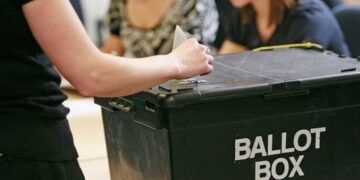NO LOCAL government in England receives more funding to carry out its services, relative to its needs, than Wokingham Borough Council, a report by the Institute for Fiscal Studies has revealed.
Published last week, the study showed that the Council received £261 more from central government per person than it needed to fulfil its duties in 2022/23 – the highest differential of any local authority in the country.
These findings come after months of borough-wide cuts to public services, which the Council has insisted are necessary to combat underfunding from central government and inflation.
Entitled ‘How much public spending does each area receive? Local authority level estimates of health, police, school and local government spending’, the report investigated the allocation of funding to England’s local authorities and found there to be ‘significant’ discrepancies between relative levels of funding and estimated needs.
Across all services, excluding schools, Wokingham received £169 more per person than its estimated need, in stark contrast to neighbouring Reading Borough Council, who received £130 less per person than deemed required.
In general, more-deprived and more-urban areas were found to receive higher levels of funding across all services, although this relationship proved weakest for local government.
The report stated: “Local government funding is much less well-targeted towards estimated needs, with only 39 areas out of 150 receiving a share of funding that is within 5% of their share of estimated spending needs.
“For instance, Wokingham received a share of local government funding that was 45% higher than its share of estimated needs, while Hounslow received 31% less.”
It added that imbalances were only partly down to choices made on revenue-raising at a local level, and predominantly due to the government prioritising other aspects of the local government funding system.
To ascertain the most accurate representation of local need, the report’s writers combined the government’s estimates of relative spendings needs of different places, and updated them with the most up-to-date data.
Cllr Pauline Jorgensen, leader of the Conservative Group, said: “This independent report, by the Institute of Fiscal Studies, puts into perspective all that the Liberal Democrat leadership has been saying about Wokingham Borough’s finances.
“The report demonstrates that, if you include all sources of funding e.g. council tax and grants, last year Wokingham Borough had more money to spend per head than our neighbours including Slough, Reading, Bracknell, and Windsor and Maidenhead.
“Despite this, the Liberal Democrats have offered poor value for money by increasing charges and cutting resident’s services.”
She added that the Conservative government had increased the Council’s grant by £1.8 million, a 7% rise which was just above the current rate of inflation, as well as providing support to those affected by the cost of living crisis through the Household Support Fund.
“The Conservative Group has repeatedly called on the Liberal Democrats to stop making the wrong choices,” Cllr Jorgensen continued.
“The cuts to frontline services that Liberal Democrats are imposing on residents, including the proposed cuts to public litter bins, are caused by their poor management, lack of experience and unsound decision making.”
Executive members expect a shortfall of more than £11 million next year if things continue as they are, and the Council has established various means of balancing the books, including its current consultation on grass cutting, public bin collections and street cleaning.
It has claimed Wokingham has been penalised by Westminster for being a “well-off borough”, receiving £400 less per household each year than the average unitary authority.
Per capita, Wokingham receives the lowest Settlement Funding Assessment of any English unitary council, with revenue support grant and retained business rates funding 11% of its services – far below the national average of 30%.
The report highlighted that the borough received 21.7% less than its relative need for public health services, which equated to funding of £32 per capita – around half the national average of £60, and well below Westminster’s £161 allocation, which was the highest in the country.
Wokingham was also given 4.4% and 0.6% less than the relative estimated need for NHS and police services respectively; the report highlighted the impracticality of moving funding between services once allocated.
The Council believes that the conclusions of the report were not in-keeping with the reality of the situation it, and the borough, faces.
It described the methods used by the Institute for Fiscal Studies and government to calculate estimated needs and allocate funding as “outdated” and “inaccurate”.
Cllr Imogen Shepherd-Dubey, executive member for finance, said: “These findings do not reflect the day to day situation we and our partners see in our borough.
“The area does have more wealthy people than most, but this heavily skews the findings. We are not able generate more income for services from people who could potentially afford to pay more as Council Tax rises are limited at 4.99%.
“A wealthy person living in a large mansion can only be at most Band H. This means that they only pays twice as much as an average band D, three bed semi-detached home within Wokingham Borough.
“Even if someone could potentially afford to pay 20 times as much council tax we can’t charge them more for our services due to legal limits.
“But this is an expensive area to live in for everyone. More and more people are heavily in mortgage debt and renters are struggling to find affordable housing.
“The report’s findings and the government’s methods for funding councils are calculated in outdated and inaccurate ways. They need to look more closely at different areas and the factors they face.
“The calculations used are similar to those which set how the government currently chooses to fund councils.
“Wokingham Borough gets the lowest amount of general funding per person from central government compared to others with similar responsibilities. Our residents get approximately £30 million less towards their services than an average per person funding for a similar council. This is about £400 per year for an average household equating to 2.5 people.
“The report findings show we have a higher income as we have had to put up council tax over the years just to fund the services we are required to by law. Approximately 70% of our income is spent on providing our statutory services, which leaves little for other valued services.
“Now with the triple threat of high inflation and growing community needs for vulnerable adults and children, alongside inadequate government support, we are looking to reduce some services so we can continue to be financially sound.
“More and more councils are now approaching the government for financial help and it is not because of their levels of deprivation.
“We continue to lobby to the government and Department for Levelling Up, Housing and Communities to get a fairer deal for our residents and their borough.”
















































